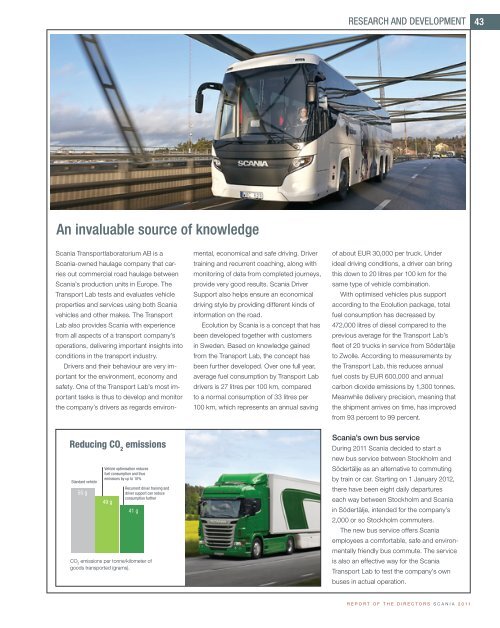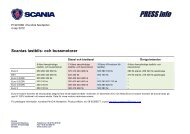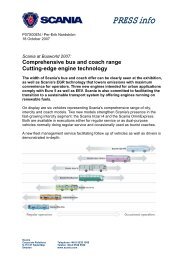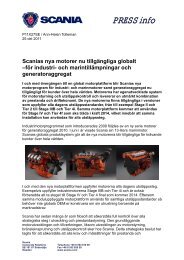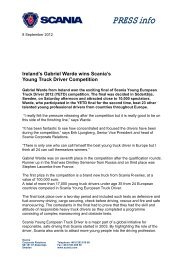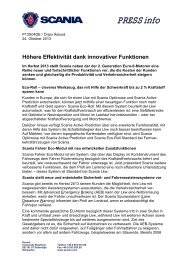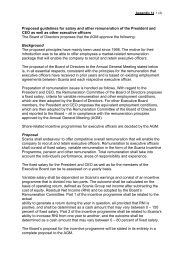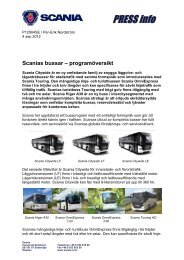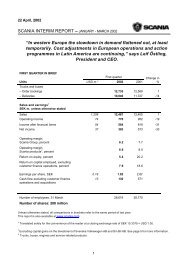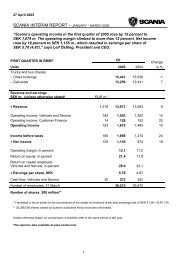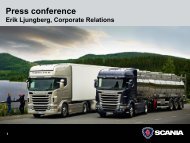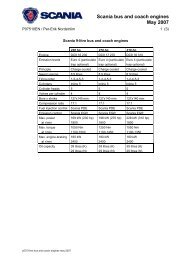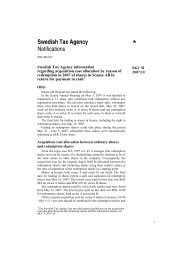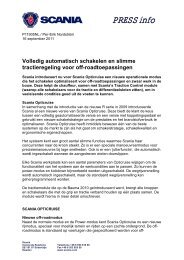Scania Annual Report 2011
Scania Annual Report 2011
Scania Annual Report 2011
You also want an ePaper? Increase the reach of your titles
YUMPU automatically turns print PDFs into web optimized ePapers that Google loves.
RESEARCH AND DEVELOPMENT<br />
43<br />
An invaluable source of knowledge<br />
<strong>Scania</strong> Transportlaboratorium AB is a<br />
<strong>Scania</strong>-owned haulage company that carries<br />
out commercial road haulage between<br />
<strong>Scania</strong>’s production units in Europe. The<br />
Transport Lab tests and evaluates vehicle<br />
properties and services using both <strong>Scania</strong><br />
vehicles and other makes. The Transport<br />
Lab also provides <strong>Scania</strong> with experience<br />
from all aspects of a transport company’s<br />
operations, delivering important insights into<br />
conditions in the transport industry.<br />
Drivers and their behaviour are very important<br />
for the environment, economy and<br />
safety. One of the Transport Lab’s most important<br />
tasks is thus to develop and monitor<br />
the company’s drivers as regards environmental,<br />
economical and safe driving. Driver<br />
training and recurrent coaching, along with<br />
monitoring of data from completed journeys,<br />
provide very good results. <strong>Scania</strong> Driver<br />
Support also helps ensure an economical<br />
driving style by providing different kinds of<br />
information on the road.<br />
Ecolution by <strong>Scania</strong> is a concept that has<br />
been developed together with customers<br />
in Sweden. Based on knowledge gained<br />
from the Transport Lab, the concept has<br />
been further developed. Over one full year,<br />
average fuel consumption by Transport Lab<br />
drivers is 27 litres per 100 km, compared<br />
to a normal consumption of 33 litres per<br />
100 km, which represents an annual saving<br />
of about EUR 30,000 per truck. Under<br />
ideal driving conditions, a driver can bring<br />
this down to 20 litres per 100 km for the<br />
same type of vehicle combination.<br />
With optimised vehicles plus support<br />
according to the Ecolution package, total<br />
fuel consumption has decreased by<br />
472,000 litres of diesel compared to the<br />
previous average for the Transport Lab’s<br />
fleet of 20 trucks in service from Södertälje<br />
to Zwolle. According to measurements by<br />
the Transport Lab, this reduces annual<br />
fuel costs by EUR 600,000 and annual<br />
carbon dioxide emissions by 1,300 tonnes.<br />
Meanwhile delivery precision, meaning that<br />
the shipment arrives on time, has improved<br />
from 93 percent to 99 percent.<br />
Reducing CO 2<br />
emissions<br />
Standard vehicle<br />
55 g<br />
Vehicle optimisation reduces<br />
fuel consumption and thus<br />
emissions by up to 10%<br />
49 g<br />
Recurrent driver training and<br />
driver support can reduce<br />
consumption further<br />
41 g<br />
CO 2<br />
emissions per tonne/kilometer of<br />
goods transported (grams).<br />
<strong>Scania</strong>’s own bus service<br />
During <strong>2011</strong> <strong>Scania</strong> decided to start a<br />
new bus service between Stockholm and<br />
Södertälje as an alternative to commuting<br />
by train or car. Starting on 1 January 2012,<br />
there have been eight daily departures<br />
each way between Stockholm and <strong>Scania</strong><br />
in Södertälje, intended for the company’s<br />
2,000 or so Stockholm commuters.<br />
The new bus service offers <strong>Scania</strong><br />
employees a comfortable, safe and environmentally<br />
friendly bus commute. The service<br />
is also an effective way for the <strong>Scania</strong><br />
transport Lab to test the company’s own<br />
buses in actual operation.<br />
<strong>Report</strong> of the directors <strong>Scania</strong> <strong>2011</strong>


